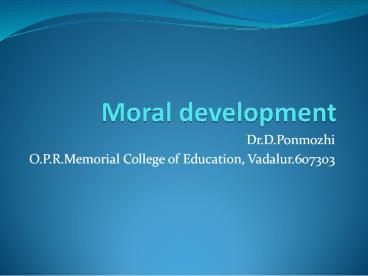Moral Development - PowerPoint PPT Presentation
Title:
Moral Development
Description:
meaning stages of moral development – PowerPoint PPT presentation
Number of Views:51
Title: Moral Development
1
Moral development
- Dr.D.Ponmozhi
- O.P.R.Memorial College of Education,
Vadalur.607303
2
Moral development
- The gradual formation of an individual's concepts
of - right and wrong,
- conscience,
- ethical and religious values,
- social attitudes, and behavior.
3
(No Transcript)
4
(No Transcript)
5
Level 1 Pre conventional
- a childs sense of morality is externally
controlled. Children accept and believe the rules
of authority figures, such as parents and
teachers.
6
Level 2 Conventional agreement
- a childs sense of morality is tied to personal
and societal relationships. - Adherence to rules and conventions is somewhat
rigid during these stages, and a rules
appropriateness or fairness is seldom questioned.
7
Level 3 Post conventional
- People now believe that some laws are unjust and
should be changed or eliminated.
8
Stage 1 Obedience-and-Punishment Orientation
- Stage 1 focuses on the childs desire to obey
rules and avoid being punished.
9
Stage 2 Instrumental Orientation naive
hedonism
- Stage two reasoning shows a limited interest in
the needs of others, - concern for others is not based on loyalty
or intrinsic respect, but rather a you scratch
my back, and Ill scratch yours - "You can play with my blocks if you let me play
with your cars"
10
Stage 3 Good Boy, Nice Girl Orientation
- children want the approval of others and act in
ways to avoid disapproval. Emphasis is placed on
good behavior and people being nice to others.
11
Stage 4 Law-and-Order Orientation
- the child blindly accepts rules and convention
because of their importance in maintaining a
functioning society. Rules are seen as being the
same for everyone, and obeying rules by doing
what one is supposed to do is seen as valuable
and important.
12
Stage 5 Social-Contract Orientation
- the world is viewed as holding different
opinions, rights, and values. Such perspectives
should be mutually respected as unique to each
person or community. - Laws are regarded as social contracts rather than
rigid edicts.
13
Stage 6 Universal-Ethical-Principal Orientation
- focus on ideas such as equality, dignity, or
respect. - Laws are valid only insofar as they are grounded
in justice, and a commitment to justice carries
with it an obligation to disobey unjust laws. - People choose the ethical principles they want to
follow, and if they violate those principles,
they feel guilty.
14
(No Transcript)































